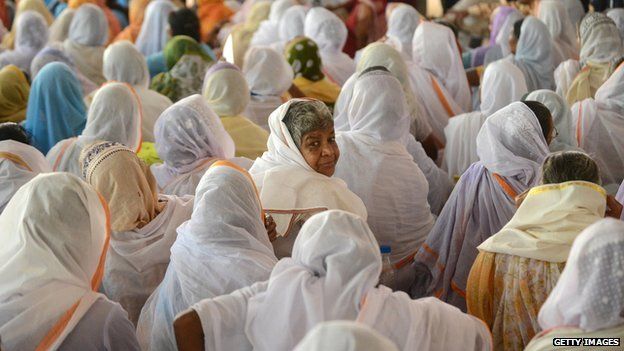The Indian town with 6,000 widows
- Published

Thousands of widows have been making their way to one particular town in the north of India. Cast out by their families, or simply alone in the world, some travel hundreds of miles to get there, and nobody quite knows why.
India is jam-packed with holy sites and pilgrimage destinations. But few places are as closely associated with the deity Krishna as is Vrindavan, on the banks of the Yamuna, a few hours' drive south-east of Delhi.
Here, in this temple-crammed town, the name of Krishna is on everyone's lips along with the name of his childhood sweetheart, Radha.
Krishna, according to great epic the Mahabharata, was born in the nearby forest and it was around here that the young flute-playing trickster flirted with the cow herders - the gopis - and enjoyed that love affair known to every Hindu with the beautiful, divine Radha.
Radha and Krishna, the two names bound together forever and in the minds of every pilgrim who arrives in town to walk the ritual circuit of temples and bathing ghats (steps leading down towards the water).
But Vrindavan has its darker, less-loving side - it is known as "the city of widows".
Spend a little while observing the pilgrims coming in and out of the temples and you see these widows - usually quite elderly women - dressed in simple white and often begging.
Widows in India no longer throw themselves on the funeral pyres of their husbands. But life for them can still be hard.
Considered inauspicious, many soon find they have lost their income and are ostracised in their home villages. Some are sent away by their husbands' families who want to prevent them inheriting money or property.
Nobody can quite explain why this particular town attracts widows from all around India - particularly, it seems, from Bengal.
There are as many as 6,000 of them in this place alone and more in the surrounding countryside.
Some come as genuine pilgrims to devote their remaining years to the service of Radha/Krishna, but many others come here to escape from brutal family homes or have been flung out by their sons and daughters-in-law as unwanted baggage.
This is one unusual aspect of Indian society that the government might prefer the outside world not to see, despite all their genuine efforts to solve the problem.
Delhi-based non-governmental organisation Maitri helps provide food and shelter for some of the widows.
In a small temple, some of them are sitting cross-legged on the courtyard floor while young volunteers slosh out piles of rice and dal.
Sitting inside, people in a smaller group tell their stories.
Most had travelled here from West Bengal, for some a journey of over 1,000 miles (1,600km) - often by themselves and many leaving behind friends and grandchildren.
Saif Ali Das is just 60 years old but she looks much older and her walk is lopsided. Her husband was a drunk, she says, who died 12 years ago after a fall.
She had a daughter who died in hospital and a son who was murdered over a land dispute. After his death she was left entirely alone and fled to this place that she had heard was safe.
Sondi is a tough 80-year-old whose husband died young, she had to bring up her four children by herself. It is her daughter-in-law who effectively threw her out, saying it was her own husband who kept the family going and "as you have not got a husband you will have to look after yourself".
For many of these Bengalis, surrounded by Hindi speakers, it is as if they are living in a foreign land. Some are feisty and resentful, others broken and afraid.
The authorities run four ashrams - a form of spiritual commune - where some of the women are housed, but many need to beg to pay for rented accommodation. Some claim that the locals treat them quite roughly and it is only the pilgrims who are happy to win spiritual merit by giving them money.
Gauri Dasi left the Bengal border with Bangladesh because of tensions in the area in 1971. She arrived in Vrindavan with her husband, with whom she had three daughters.
He then deserted them and all her daughters were married off when they reached the age of 10.
Dasi has been living alone in Vrindavan for the past 15 years and feels pushed into dedicating her life to the devotion of Radha.
She gets paid a few coins for singing devotional songs in the temples. She has become one of India's millions who have renounced the world to follow a spiritual path, but she is one of the reluctant ones.
Many of these servants of god appear to live tragic lives on the streets of this romance-drenched town.
The government and pilgrims can help keep these refugees from family life away from starvation, but they are less able to quell injustices and age-old superstitions in Bengal.
For some here, to even cast an eye on a widow is considered deeply unlucky.
How to listen to From Our Own Correspondent:
BBC Radio 4: Saturdays at 11:30 and some Thursdays at 11:00
BBC World Service: Short editions Monday-Friday - see World Service programme schedule.